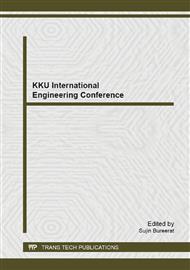p.1608
p.1614
p.1621
p.1626
p.1631
p.1636
p.1642
p.1647
p.1652
Robustness Evaluation of Job-Shop Scheduling Based on Theory of Constraints (TOC)
Abstract:
This study aimed to present the robustness evaluation of job-shop scheduling based on Theory of Constraints (TOC) concept under processing time and demand variations using simulation technique. The performance of schedule based on TOC and traditional method (minimizing Cmax) were compared in terms of schedule robustness and performance. Simulation test scenarios were carried out by applying different distributions of processing time with two case problems as single and double bottlenecks cases. In addition, demand variation was added to the simulation test at the last experiment to increase the system variation. The results showed that the schedule based on TOC concept was superior to the schedule from traditional method when the variation in both processing time and demand were increased and the production system was more complicated as can be observed from the results of double bottlenecks case.
Info:
Periodical:
Pages:
1631-1635
Citation:
Online since:
May 2014
Authors:
Price:
Сopyright:
© 2014 Trans Tech Publications Ltd. All Rights Reserved
Share:
Citation:


